- Home
- Meg O'Brien
Gathering Lies Page 5
Gathering Lies Read online
Page 5
Now I understood the genuine kindness that lay behind Thornberry’s latest incarnation. There were no “page police,” no monitors of one’s work. The only thing Timothea asked was that the women who came here grow in some way that might further their talent. How they did that was their own business. They might take walks in the woods, keep a journal, help out with the organic farming, or even—if they wished—simply feed the two resident goats.
The conversation this night, dominated by Grace as usual, turned to politics. Since my life in Seattle had been saturated with troublesome politics, I had difficulty participating. But Grace was young and brash. She liked to mouth off for the sake of mouthing off, reminding me of certain teenagers I’d defended over the years—though Grace was clearly in her mid-to late-twenties.
“We’ve got to fucking bomb them,” Grace said firmly. “It’s the only way.”
This brought me out of my woolgathering long enough to wonder who she was talking about. Iran? The cornfields of Iowa? Anything could be turned into an enemy by this woman, I had learned.
Dana jumped in with an obvious attempt to change the subject. “Lucy, I love the way you use herbs in your cooking,” she called out to the cook, who was putting cookies for dessert into the oven.
“Thanks,” Lucy said. “You’re writing about herbs, aren’t you? We should talk one of these days.”
“I’d love to,” Dana said. “It’s not all about herbs, but they’re a large part of it. It’s about using what nature gave us, to heal—something even doctors are beginning to believe in.”
“Doctors!” Amelia, the poet, said scornfully. “I’ve never in my life gone to a doctor that I didn’t end up sicker than I was in the first place. And to add insult to injury, they put you in the poorhouse doing it.”
Dana smiled. “That’s how I got started on my book. I was sick, and as a writer, I couldn’t afford insurance. I began to study herbs and what they could do.”
“I don’t give much ground to herbs, either,” Amelia muttered. She tapped her forehead, and her short white curls bobbed. “It’s all in the mind. Doesn’t matter what you take, it’s in the mind.”
“Oh…” Jane began uncertainly, “you mean, you could take either prescription medicine or herbs, and depending on which one you believed in—”
“Turnips!” Amelia snapped. “You could take turnips, woman! It doesn’t matter what you take, it’s all in the mind.” Grace cast a contemptuous look at both of them and went back to stabbing her pork.
Dana, who didn’t eat meat, picked at her vegetables. An awkward silence filled the kitchen, and Jane stepped in again, changing the subject. Laying down her fork, she stretched and sighed.
“What a wonderful meal! You know, I can’t believe I’m here. After the PTA, the constant laundry, the carpooling—this is heaven.”
“Don’t tell me you don’t have a house full of servants,” Grace taunted.
“No. No, I don’t,” Jane answered slowly. “I have a once-a-week housekeeper, that’s all.”
“But a house that’s big enough for an army, I’ll bet,” Grace replied, zeroing in. “You people with your big houses, big cars, big everything—you’re ruining the world.”
“Grace!” Dana said softly. “You can’t just lump everyone—”
“Don’t give me that!” Grace interrupted. “It’s true. The rich are responsible for most of the ecological problems in the world. Everyone knows that.”
“Well, we don’t have to talk about it now,” Dana said mildly, casting a sympathetic glance at Jane. “Can’t we, for once, just have a nice dinner?”
“And just exactly when would you recommend we talk about the way the rich ruin the world?” Grace pushed. “What nice dinner would you prefer to ruin?”
Jane, turning a deep shade of red, stood and carried her plate to the sink. “I think I’ll turn in early,” she said.
I felt sorry for her. And just as sorry for myself. There were times when I thought I couldn’t stand another dinner with these women. Always fighting, arguing, picking on each other.
All but Jane, who tried, but didn’t have the ongoing fortitude to stand up for herself. And Dana, who did her best to keep the peace.
The rest, excluding Timmy, reminded me of children. Women in their twenties, thirties, forties, even seventies—going on five years old. Put a bunch of women together on an isolated island, and see what you get.
Later, I told myself that if I’d known how bad things could really get, I might have made a point of enjoying my “final meal.”
Jane would echo my thoughts. “If only I had known…” she would say numbly, over and over—though even she knew it was bad form to write that in a novel.
We were in the living room of the farmhouse when it happened—Grace, Amelia, Dana and myself. Jane had gone back to her cottage, and Kim Stratton hadn’t shown up at all. Timothea and Lucy were in the kitchen, cleaning up.
As was usual after dinner, we had gathered in comfortable chairs and sofas before the huge stone fireplace. A large bouquet of freshly cut flowers filled the hollow of the fireplace rather than wood, a nod to the overly warm weather that had fallen over the San Juans this day.
All four of us were at varying stages in our writing lives. Dana was working on her nonfiction book about natural healing, Amelia on a new poetry collection, and Grace…Grace never did say. The only thing I knew at this point was that she must have had a strong reason to come to this isolated island of few inhabitants and very little communication with the outside world. Esme was owned by Timmy and two of the other home owners on the island. Electricity came by way of generators, and water by wells. There was one battery-operated radio in the Thornberry office, and one cell phone serviced through a tower on Orcas. We had been asked to leave our own cell phones behind, and Timmy believed that she and the staff should live as simple a life as the residents here.
As for weather, it could get wild here even in the spring, with gale-force winds and unending storms. No one came to Esme without a good reason.
That night, however, had started out peacefully enough. Through French doors we could see a setting sun. A family of deer munched on grass on the lawn. Dana smiled and said, “Jane was right. This really is heaven.”
Amelia snorted. “Heaven, is it? Well, if you run across God, ask him how we’re supposed to keep those bloody little woodstoves going in the cottages. Someday I’d like to write an entire ten-line poem before the damn thing goes out.”
Dana sent a grin to me, and I turned to Amelia. “You sound like you don’t like it here.”
Amelia folded her arms across ample breasts. “I didn’t say that, did I?”
I smiled. “No, you didn’t say that.”
“Well, don’t go putting words in my mouth.”
Amelia stared into the fireplace as if flames flickered there.
Perhaps Dana was right, I thought. Old trauma—murders, even—must be hanging around Thornberry. Otherwise, why were so many people here in a bad temper?
Tonight was worse than ever. There was something in the air, and it was affecting everyone. Kim Stratton, I thought, knew what she was doing, hiding out at night. From now on, I vowed, I would do that, too.
“Well, I guess I’ll get started,” Amelia said, pulling a thin sheaf of white paper from a needlepoint briefcase.
I stifled a sigh. Here we go again. More cutoff breasts and blood gushing from women’s vaginas into male-dominated ground. God save me from the political ones.
Amelia’s latest was indeed another politically driven, and—to give it credit—probably award-winning piece. I closed my eyes and tried to pretend I was listening, while in truth I was working on my own book in my head.
I felt a jolt, and my eyes flew open.
“Did anybody else feel that?” Grace asked.
Amelia looked up from her paper and frowned. “Feel what?”
Grace rubbed the back of her neck. “I don’t know…I thought I felt something.”
&n
bsp; “You did,” I confirmed. “I felt it, too.”
“Probably a gust of wind,” Dana added. “Coming from the kitchen. Lucy’s got the door open back there.”
Amelia returned to her reading.
“Damn, there it goes again!” Grace jumped to her feet.
Her words were barely out before the room shook violently.
“Earthquake!” Dana cried, her mouth forming a startled O. She grabbed the sides of her heavy armchair as it slid like dollhouse furniture along the hard-wood floor, striking the fireplace and throwing Dana into the hard stone facing. She screamed. Grace staggered and fell several feet across the room, hitting a coffee table with her knees and falling into a bookcase. Blood spurted from her nose. The bookcase pitched forward, burying her beneath it. I rose and stumbled for balance, grabbing Amelia, who looked so pale I thought she might faint. There was nowhere to go, however. Nowhere to hide.
All around us, windows shattered. Glass rained down. The tiny panes of the French doors were sharp slivers. I felt a stab on my cheek as figurines, now projectiles, flew from the fireplace mantel and shelves. Mini-blinds rattled and broke, falling to the floor with a clatter. The deep rolling motion went on and on, seemingly forever, and the piercing screech of Thornberry’s house alarm filled the night.
When the rolling and pitching was over, we were all in various positions on the floor. Dana lay against the hearth, blood dripping from her arm. Grace, still buried by the bookcase, groaned, but pushed at its weight and crawled out from under. Her nose was bleeding, and Amelia, next to me, looked dazed, her mouth drooping open.
I struggled to my feet, holding onto an end table. Heading across the room to Dana, I felt the warmth of blood trickling down my cheek. The living room was cluttered with debris; plaster had fallen from the ceiling, and glass crackled under my feet as I gingerly moved first one heavy beam, then another that had fallen from the ceiling. Sliding on a pile of books that had landed in the middle of the floor, I fell to a knee and yelped as a sliver of glass cut through my skin. Red flowed through my khaki pants.
Kneeling cautiously next to Dana, I checked her injured arm. The cut was four inches long and covered with plaster dust. That helped to staunch the bleeding, but the dirt and dust of years that had fallen with it weren’t good news.
“It doesn’t look too bad,” Dana said shakily, wincing at my light touch. “I think we lucked out. Sarah, your face is cut.”
Grace spoke from behind us, her tone sharp. “We can’t stay in here. There’ll be aftershocks.”
“Dana’s arm has to be cleaned,” I said, helping her up, then repeated, “It needs to be cleaned.”
I was on automatic, operating out of shock as my mind searched frantically to remember what I’d learned in all the earthquake preparedness meetings at the Justice building. I knew we had to get out of the house, but nothing made sense at the moment except to clean Dana’s wound. The fact that my own face was bleeding had no effect on me whatsoever.
“You, too, Grace,” I said. “Your nose is bleeding.”
Holding Dana’s good arm, I began to move cautiously with her over the shattered glass toward the downstairs bathroom. The ground started to pitch again.
“Damn it, we’ll be buried alive in here!” Grace yelled, grabbing Amelia and running for the front door.
Dana and I swung around toward the door, but none of us made it. The aftershock felt even more violent than the first tremor, and this time we were thrown to the floor right where we stood. A board with nails in it barely missed my chin. Dana cried out, her face twisting in pain.
Screams issued from the kitchen.
“Timmy!” Amelia cried. “She’s hurt!”
The center stairway from foyer to the upstairs level came crashing down, the spokes below the banister popping free and shooting in every direction like a bundle of Lincoln Logs hurled by an angry child.
Amelia’s voice rose to an hysterical pitch. “Timmy! I’m coming!” She began to crawl toward the rubble of stairs, now a huge pile that rose halfway to the second floor.
“No!” Grace yelled, pulling her back just in time to save her from a flying stair tread full of nails. “You can’t get through that way!”
She gave Amelia a hard shove through the front door, which was hanging by one hinge. The woman landed on her knees in the grass, crying out.
Dana and I made it to our feet and followed. Grace was the last one out, glancing toward the blocked-off kitchen before she stumbled through the doorway. She turned and looked up, on her face an expression of horror. I followed her gaze as the two upstairs levels of the farmhouse slid toward us like the top layers of a wedding cake.
We all turned and ran. From a safe distance we watched in disbelief as the entire mass shuddered, then thundered to a heap on the ground.
When the dust had settled, we staggered numbly to the debris and stared into its mass—boards, pipes, plaster, furniture, clothes and bathroom sinks. The huge chimney had fallen, and though parts of the farmhouse living room walls remained upright, there was no longer a ceiling or a roof. Nothing was left but a pile of rubble and bricks.
It was Dana who pointed out that the ground was no longer shaking. “Do you feel that? It’s stopped.”
We stared at each other, a mixture of relief and fear in each face.
“It’ll start again,” Grace said. “When it’s this big, there are hundreds of aftershocks.”
“She’s right,” I agreed.
I didn’t want to admit how frightened I was. Authorities in Seattle had been warning for years that the Big One was coming, and if this was it, there would be hundreds, perhaps thousands of aftershocks, and possibly even tidal waves, the dreaded tsunamis. I wondered how close the epicenter was.
My gaze swung to the kitchen wing, which was new and one-storied. It was still standing, though windows had popped out and parts of the roof had caved in.
“Listen,” I said.
Grace looked in that direction, her voice sharp. “To what?”
“It’s too quiet in there.”
Everyone turned that way.
“Oh, my God, Timmy!” Amelia cried. She swung around to Grace. “You should have let me go to her!”
“I saved your ass, old lady,” Grace shot back, hands on her hips. “You could be under that rubble with them.”
Amelia flushed, her face red and tear-streaked, hands shaking. “I don’t know who you think you are—”
I broke in. “Stop it, both of you! For God’s sake!”
“It doesn’t look all that bad,” Dana said softly. “They could be okay. But what about Jane and Kim?”
A wave of fear swept over me. Had they—had anyone else—survived?
“Timmy can’t be all right,” Amelia said querulously. “She would be here by now, checking on us. Something’s happened to her, or she’d be here by now!”
We no longer had access from the front. Heading at a run around the side of the house, we made for the back kitchen door. Slowing down as we reached it, Dana held her arm to staunch the renewed bleeding, and Grace rubbed a finger beneath her nose, which only smeared the blood that had been coagulating there. My legs shook, and I could see that Amelia was none too steady. I reached out and took her arm, urging her to lean on me.
The kitchen door stuck, but we were able to force it open despite the objects that had fallen against it. Once inside, the scene stopped us in our tracks. Though parts of the roof were indeed unscathed, there were huge, gaping holes. The entire inside ceiling had fallen, as had the skylight. Glass was everywhere, on cupboards, tables, in the sink, on the floor. Copper pots, which had hung gleaming on the walls only moments before, lay in a pile. Dishes had flown from cupboards and were strewn from one end of the room to the other. The huge stainless steel refrigerator had slid and lay on its side halfway across the room from where it had stood for years. Its door lay open, and jars of home-preserved jams had fallen out and broken. Reddish-purple streams of blackberry and raspberry jam fl
owed like blood onto the floor.
It was this that caught my attention first. I thought it was blood, and I ran to it, then realized my mistake. At the same time, I heard a moan.
“Quiet!” I yelled at Grace, who was issuing orders to Amelia and Dana to search through the rubble. “There’s somebody here.”
We lifted the heavy appliance together, all four of us at one end, and pushed it out of the way. The person under the fridge was Lucy, and as her condition became clear, Amelia began to cry. “Lucy…oh, poor Lucy.”
I checked her pulse, though it wasn’t necessary. Lucy’s neck was broken, her head twisted at an odd angle to her body. “She’s dead,” I said quietly.
“Poor, poor thing,” Amelia whispered, rocking back and forth on her knees and touching the other woman’s face as if to bring her back to life.
“For God’s sake, woman!” Grace said. “It’s not like she was your best friend!”
Amelia’s breath caught on a sob. She looked around frantically. “Timmy? Where is Timmy?”
“I heard a moan,” I said. “If it wasn’t Lucy—”
We began to toss debris aside, and in a corner we finally found Timothea, semiconscious, her eyes closed.
Amelia gently touched her face. “It’s all right, it’s all right, all right…” she murmured over and over.
I stroked the gray hair back from Timmy’s forehead, which was smeared with blood. Dana went to the sink for a wet rag. When she turned on the faucet, nothing came out.
“Damn!” She rummaged under the sink for bottled water, then in the open cupboards. Finally, she uncovered a bottle in the wreckage on the floor.
“Not too much,” I warned, as Dana wet the rag. She looked at me questioningly.
“We don’t know how long we’ll be without, or how much more we’ll find,” I said. “We’d better ration it.”
Dana nodded and screwed the cap back on the water bottle, handing me the dampened rag. I wiped the blood from Timmy’s forehead, and she opened her eyes. They registered shock, then comprehension, then worry.
“Is everyone all right?” Her voice was shaky, but her grip on my arm was strong.

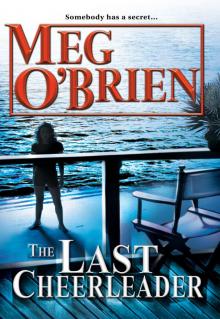 The Last Cheerleader
The Last Cheerleader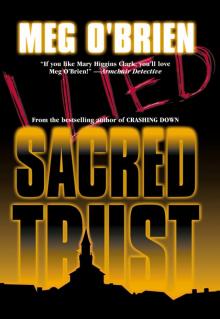 Sacred Trust
Sacred Trust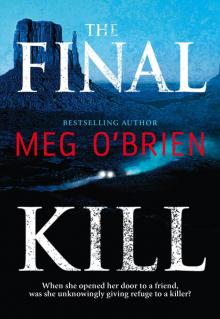 The Final Kill
The Final Kill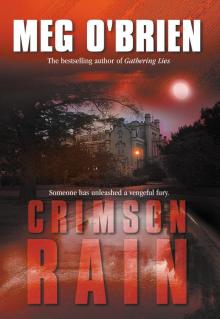 Crimson Rain
Crimson Rain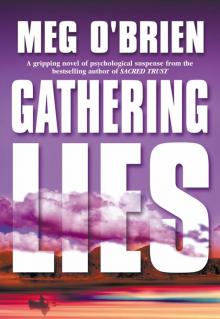 Gathering Lies
Gathering Lies